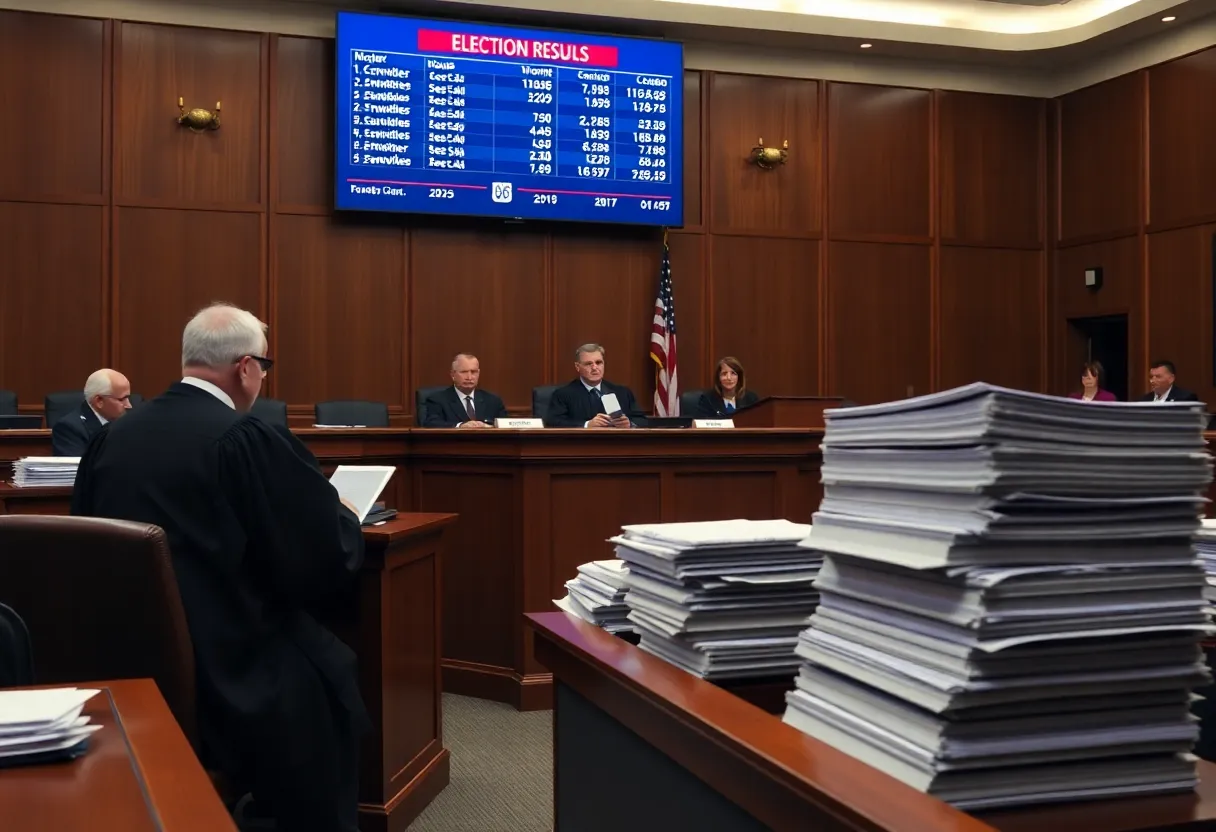News Summary
A North Carolina trial judge has upheld the Supreme Court election results following a challenge from Republican candidate Jefferson Griffin. Judge William Pittman confirmed the validity of the election outcomes, despite Griffin trailing behind Democratic Associate Justice Allison Riggs by 734 votes after recounts. This legal decision reinforces the authority of election officials, while Griffin’s team plans to appeal, raising ongoing concerns over voter eligibility and election integrity amidst polarized community reactions.
North Carolina Court Upholds Supreme Court Election Results Amid Contentious Challenge
In a rather significant turn of events for the North Carolina Supreme Court race, a trial judge has decided to stand by the election results, giving a decisive nod to the authority of election officials. Judge William Pittman has confirmed decisions made earlier by the State Board of Elections regarding a protest initiated by Republican candidate Jefferson Griffin.
The Election Landscape
After casting over 5.5 million ballots, the results show Griffin trailing behind Democratic Associate Justice Allison Riggs by 734 votes. Two recounts have already reinforced this margin, but Griffin’s campaign isn’t backing down just yet. He raised concerns after the election about a significant number of votes—nearly 66,000 contested ballots—and claimed that certain categories of voters had been improperly counted in the race tallies.
Understanding the Legalities
On Friday, Judge Pittman entered orders that essentially upheld the State Board of Elections’ previous rulings from December, which dismissed Griffin’s protests. His conclusion asserted that the Board’s decisions were lawful and respected constitutional provisions. This ruling is crucial as it represents one of the few unresolved electoral disputes left from the November 5, 2024 elections.
The Broader Context
The legal battle doesn’t end here. Griffin’s attorneys are gearing up to appeal this ruling, which is likely to push the case up to the state Supreme Court. Should it come to that, interestingly enough, Justice Riggs would need to step aside from the proceedings, leaving five of the remaining six justices who are registered Republicans.
Diving Deeper into the Ballot Controversy
The bulk of the contested ballots—around 60,000—came from voters who had incomplete registration records. Many of these voter records lacked essential identification details, such as a driver’s license number or Social Security number. Additionally, other contested votes involved overseas voters and military personnel who also didn’t provide the necessary identification, raising further questions about voter eligibility.
A Clash of Perceptions
While Griffin’s team has expressed ongoing concerns about voter eligibility and election integrity, supporters of Riggs view these actions more critically, seeing them as a potential assault on democratic processes that should be safeguarded. The stakes are high, and this conflict reflects an ongoing national narrative about election integrity, with many civics groups actively voicing their opposition to Griffin’s challenge on the grounds of protecting voter rights.
Community Sentiment and Reactions
The community response has been quite polarized. Supporters of Justice Riggs feel reassured, maintaining that her victory should ultimately be honored after confirming the results through recounts. Contrarily, Griffin remains steadfast, insisting that the integrity of the election process needs to be scrutinized and enforced. This push and pull showcases a larger tension that is permeating voting conversations across the country.
Looking Ahead
The developments in North Carolina are indeed part of a more extensive trend sweeping the nation—where legislative efforts to challenge voting processes have become more pronounced amid the ongoing dialogue about election integrity. As this case unfolds, all eyes will be watching how it may influence the perception and operations of electoral processes not just in North Carolina, but potentially nationwide.
As we keep an eye on developments from both Griffin and Riggs’ camps, one thing is clear: the election landscape is anything but dull!
Deeper Dive: News & Info About This Topic
- AP News: North Carolina Election Supreme Court Votes Challenge
- New York Times: North Carolina Supreme Court Race Ruling
- WBTV: New Bill Could Bring Big Change to Early Voting in North Carolina Elections
- CNN: North Carolina Voting Ballot Challenge
- Democracy Docket: North Carolina Judge Rejects GOP State Supreme Court Candidates’ Bid to Throw Out 60K Ballots
- Wikipedia: North Carolina
- Encyclopedia Britannica: North Carolina
- Google Search: North Carolina Supreme Court
- Google Scholar: North Carolina Elections
- Google News: North Carolina Voting Integrity







